Best 13 Foods For Osteoarthritis That You Need
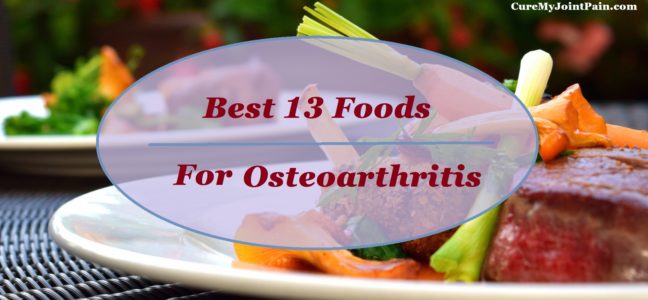
Did you know that what you eat has to do with your pain?
A wrong diet can worsen your condition – while eating the right foods can even reduce your pain. And osteoarthritis is the best example.
For this reason, today I want to show you the best 13 foods for osteoarthritis.
If you’re one of those millions suffering from this condition, it’s simple:
- Only make a few adjustments to your diet
- And things should start to get better – on the long term
Obviously, depending on the level of your pain.
Note: These 13 foods won’t cure your osteoarthritis alone, but they can help your body and decrease your pain partially.
1. Citrus
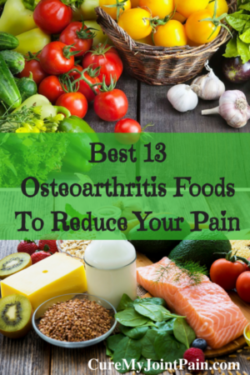 It’s quite obvious that fruits and vegetables wouldn’t hurt in osteoarthritis – but some of them are even better than you think.
It’s quite obvious that fruits and vegetables wouldn’t hurt in osteoarthritis – but some of them are even better than you think.
So how can lemons and oranges help? Well, they contain the biggest quantity of Vitamin C among all fruits:
- This vitamin helps the normal development of cartilages
- If you don’t have enough Vitamin C – your cartilages start to weaken and lose their mobility
These symptoms should sound familiar to you – because that’s when osteoarthritis appears.
The good news is that you can take enough Vitamin C from citrus fruits:
- Lemons
- oranges
- mandarins
These are the most common, but you can try other fruits from this family as well.
2. Steamed Meat
Unlike other conditions – no meat is forbidden in osteoarthritis. However, it’s essential to know how it was prepared:
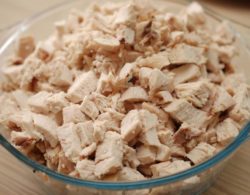
- Deep fried meats bring in lots of extra fats and calories
- Even frying vegetables isn’t extremely recommended – because they lose most of their vitamins
So if we’re talking about meat, things are even more dangerous.
For this reason, the best way to cook your meat is by steaming it:
- the meat will keep its nutrients
- you will make the most of your meal
Obviously, fast food and processed meat are a must on your avoiding list.
Besides the way they are prepared – they also contain too much salt, which is extremely dangerous for joint conditions.
So instead of eating out every day, try to prepare your own food in a healthy manner. If you can’t do that all the time, at least cook your meat yourself.
3. Cherry Juice
 Because of their anti-inflammatory molecules, cherries are a great remedy for osteoarthritis. And it’s not only this.
Because of their anti-inflammatory molecules, cherries are a great remedy for osteoarthritis. And it’s not only this.
Several studies also showed that cherry juice helps muscles recover faster:
- after an intense work out
- or after a massive effort
When you have OA – every step requires a physical effort. So your muscles may suffer from exhaustion at one point.
If that’s your case, try to drink a glass of cherry juice twice a day.
In a few days – you should notice a difference.
- You can also eat fresh cherries – but they’re a bit harder to find in certain seasons
- So the juice remains an easier choice
However, make sure you’re choosing an organic juice and not a processed one. Otherwise, it probably won’t help too much.
4. Tofu
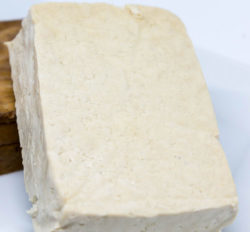 Who would have thought that tofu could help osteoarthritis?
Who would have thought that tofu could help osteoarthritis?
Well, this food is prepared pretty different from cheese:
- coagulating soy milk
- pressing it into soft white blocks
In fact, it’s the soy milk inside that is beneficial for joint pain.
According to some studies, the proteins from soy milk manage to decrease chronic inflammation.
However, they work mostly for knee joints. But here’s another interesting fact:
- Tofu didn’t show impressive results in rheumatoid arthritis – which is caused by inflammation
- On the other hand – it seems to be very effective is osteoarthritis
So if you’re a fan of tofu, make sure you consume this food daily. If not, you can at least give it a try every now and then. It brings too may benefits to just let it go.
5. Fish

No matter what condition you had – fish is always the best kind of meat. In osteoarthritis it’s even more beneficial:
- because of its Omega 3 Fatty Acids
These substance help decrease the inflammation by lowering our body’s response to it.
It’s like stopping the swelling and letting it decrease alone.
However, not every kind of fish is perfect for your diet. Scientists advise us to choose only those that contain a low quantity of mercury:
- Shrimps
- Salmons
- Sardines – these are some great example
Also, if you’re a fan of lobster and you afford consuming it often, it’s another good choice.
Make sure you eat fish more often than other kind of meat. None of them has so many nutrients as fish – and you really need as many as possible.
6. Spicy Soups
 If you’re a fan of soups and you enjoy preparing your own recipes at home – they’re the best choice for you.
If you’re a fan of soups and you enjoy preparing your own recipes at home – they’re the best choice for you.
A large number of spices are great anti-inflammatory and they work great for joint pain:
- Turmeric is probably the most famous
- But there’s also ginger, cinnamon or cayenne pepper.
So instead of taking these remedies as supplements = you can use the powder to make a soup.
You can either use one of them or combine several herbs, depending on your taste.
However, you won’t get the same effects as with supplements = because our body doesn’t absorb each substance the same.
But as we’re talking about osteoarthritis – herb supplements don’t make the #1 choice, so it doesn’t matter that much.
What really matters is that spicy soup can be a great solution to keep your pain under control.
7. Peanut Butter
Who would have thought that such a basic ingredient can be so good in OA?

Peanut butter contains a high amount of Vitamin B. This substance is responsible for 2 things:
- improving joint flexibility
- decreasing the inflammation
It might sound too good to be true? Well, there are several studies behind and they all reached the same conclusions.
However, don’t imagine that any $3 peanut butter works.
Cheap products are usually processed foods, so they can bring more dangers than benefits. For this reasons:
- Try to get a more organic peanut butter
- You can find many products that cost less than $10 and have much better proprieties
But don’t imagine you have to eat peanut butter all day long. Consume it just as before, at breakfast, as a snack or before going to bed. You will surely see the benefits after a while.
8. Whole Grain Cereals

Here’s another breakfast ingredient that you should never miss from now on.
Though they are good for almost any health problem – whole grain cereal also work in osteoarthritis and chronic joint pain.
Just like many other foods, they were studied a lot in the last years.
The results were the same:
- they increase joint flexibility
- and they reduce the stiffness
- they also control the pain partially – but in this case the improvement wasn’t huge.
However, cereals are a very convenient food for most people. There are very few persons that don’t like them. Besides, they’re also the most popular choice for breakfast.
So instead of eating basic cereals tomorrow morning, try some whole grain ones. They shouldn’t taste any worse, don’t worry.
9. Pineapple Juice
If you ever heard of bromelain – you should know that it comes from pineapple.

This substance is in fact an enzyme with a great anti-inflammatory effect.
In fact, a lot of supplements contains bromelain especially for its proprieties in decreasing the swelling.
But here’s an interesting fact:
- no study confirmed its effectiveness yet
- that despite being used in hundred of supplements
Scientists do admit that it works in osteoarthritis – but they don’t know the doses, side effects and possible interactions with other medicines.
But don’t worry – every supplement from the market was tested out carefully, and they all proved to be safe to use.
So if you prefer to stay away from supplements, you can try:
- fresh pineapple
- pineapple juice
They both contain certain doses of bromelain, which can cure part of your pain.
10. Spinach & Lettuce
Green leafy vegetables are a great source of antioxidants, everyone knows that.
However, not everyone knows that antioxidants are great for inflammation:

- they fight back free radicals – those harmful substance from our bodies
- among others, free radicals damage joints and cartilages
If that doesn’t sound too scary for a healthy person – it surely does for an osteoarthritis patient.
For this reason, try to eat a lot of green vegetables. However, make sure they organic and try to eat them fresh.
Boiling any green vegetable would make it lost the biggest part of its vitamins and nutrients. So is it really worth it?
If you’re a fan of salads, it’s even because you can try out hundreds of recipes.
If not, combine only one vegetable with a more pleasant ingredient, like cheese. Either way, make sure you’re consuming the leaves fresh.
11. Nuts
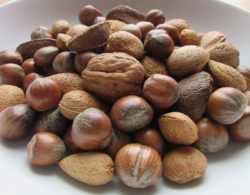 Just like green vegetables, nuts also contain lots of antioxidants – so they are great at fighting back free radicals.
Just like green vegetables, nuts also contain lots of antioxidants – so they are great at fighting back free radicals.
What’s even better is that the whole family has this propriety:
- almonds
- walnuts
- even pistachios
If you get bored of eating nuts every day – you may get to almonds for a week and then choose another member.
Nuts don’t necessarily reduce the pain – but:
- they keep the joints and cartilages healthy
- they can also help improve their general shape – especially in a condition like OA
So if you’re not a big fan of nuts in general, you should become one soon. Their benefits outweigh their regular taste.
12. Beets
Have you ever thought that beets could have anything to do with osteoarthritis? I definitely haven’t.

Because of their red color, beets contains lots of antioxidants – maybe even more than nuts and almonds. But that’s not all.
There are also lots of minerals inside a small portion of beets:
- magnesium
- potassium
- even folate
All these nutrients make it an excellent choice, and not just for OA.
So just like green vegetables – beets can protect your joints and bring them back to life.
Though it’s hard to get amazing benefits just from beets alone, they surely help:
- If you manage to eat them fresh, in salads – it’s amazing
- If not, you can try either beet juice or boiled beets – depending on which you like best
Feel free to experiment with any of these healthy foods.
13. Cabbage & Broccoli
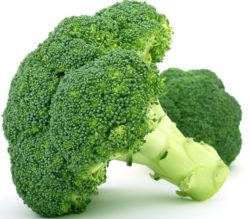 Just like every herb from their family – cabbage and broccoli contain high quantities of vitamin C:
Just like every herb from their family – cabbage and broccoli contain high quantities of vitamin C:
- This doesn’t only protect the joins
- It also improves the damaged cartilages.
Besides, there are also carotenoids inside cabbage and broccoli.
These are great example of antioxidants. And as I’ve showed you their benefits above – you probably know what to expect from these foods.
One thing you should know about these vegetables is this:
- they can easily lose their nutrients
This usually happens at high temperatures – so if you can, avoid boiling or cooking them.
Instead, use them in salads, smoothies or even eat them fresh. They may end up being more useful than you think.
So What’s Your Favorite Food For Osteoarthritis?
When you have a condition like this, diet is extremely important:
 it can help you
it can help you - or it can hurt you
For this reason, you need to pay extra attention to everything you eat.
These 13 foods that I mentioned above are not only safe -but they will also help you deal with this condition.
Every ingredient is beneficial in its own way, but combining them is even better. In this way, you can get the most of each one’s good points.
- Make sure you follow a healthy diet
- But most importantly – make sure you’re eating things that you like
If you’re a fan of fast food, that would be hard – so making a change is a must.
However, if you enjoy colored fruits but hate beets and spices, adapt your diet to your preferences.
In this way, both you and your joints will be satisfied.
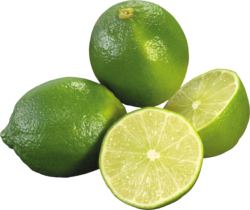 it can help you
it can help you 
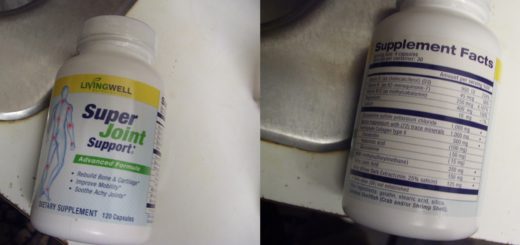
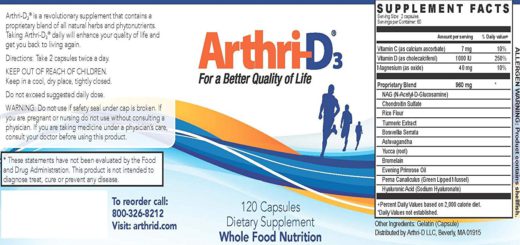
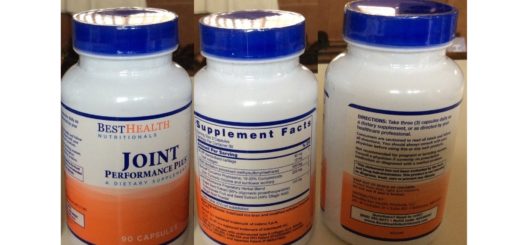
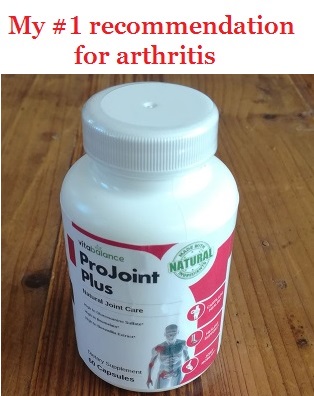
My grandmother turns 90 this year and has osteoarthritis. She’s taking her prescription but it doesn’t seem to help. I was looking for the natural way, so definitely going to get her some of the things you listed and incorporate it into her diet. Most are regular foods which I didn’t know would help.
Do you think they could also help for prevention (I have many cases of arthritis in my family)?
Also interested in buying the ProJoint Plus that you recommend. I see it is also a supplement that contains natural extracts which is what I was looking for.
Hey Jean, osteoarthritis drugs need a long time to start working – so that’s why your grandmother doesn’t feel any better. But she should – in the future.
It’s pretty much the same with supplements, but it depends a lot from person to person.
For example, when I used ProJoint Plus I could feel a change in my pain in about 1 week. But it took me over a month to notice an improvement in my joint flexibility.
Now – these foods should really help your grandmother, but keep one thing in mind. These aren’t supplements/drugs, so they contain less beneficial substances. Foods alone aren’t going to make her feel better.
Sure, adding them to her diet would be great – just don’t expect miracles from diet alone.
And it’s the same for prevention as well. Foods alone aren’t going to keep you arthritis free – but they might delay the condition.
So they can somehow help preventing OA. But I can’t tell for sure, because there aren’t any studies or medical evidence on this topic.
Anyway – osteoarthritis isn’t such a genetic condition, as other forms of arthritis (rheumatoid or psoriatic arthritis, gout). So I wouldn’t worry too much if I were you.
Regarding ProJoint Plus, I didn’t really understand if you want to buy it for your grandmother or for you, as a prevention measure.
Well – if it’s for her, it should really help.
But as I said, tell her to be patient and take it for at least 2 months.She might see a difference only after, it only depends of her.
Now – if you’re thinking about using a supplement for prevention, I don’t really recommend it.
There’s no point taking pills if you don’t need them now. Instead, try to have a healthier lifestyle and move around a lot. This will keep your joints flexible – so if you ask me, it’s the best way to prevent OA.
If you add it to a healthy diet, it’s even better.
Hope this helps.